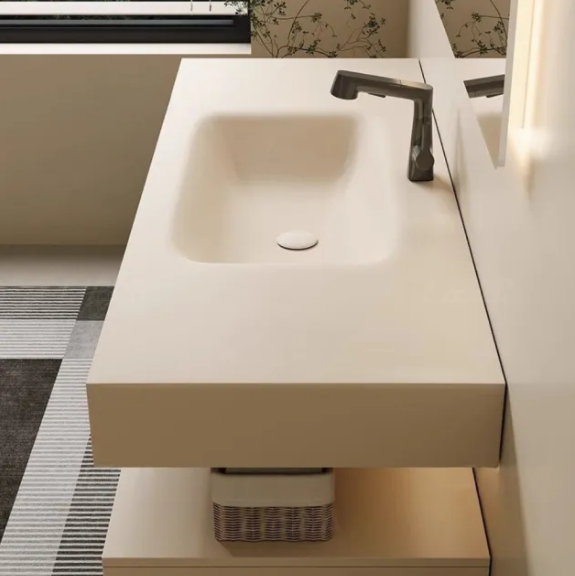Dear homeowners and design enthusiasts,
Selecting the right bathroom vanity is a crucial decision that impacts both the aesthetics and functionality of your space. Today, we delve into a classic dilemma: wall-mounted vanity versus freestanding vanity. This choice transcends mere appearance—it reflects your lifestyle preferences. As your professional bathroom furniture supplier and renovation consultant, we provide a comprehensive analysis across multiple dimensions to help you identify the optimal solution.
1.Aesthetic Design and Spatial Impact 🎨
Wall-mounted Vanity
The preferred choice for modern bathroom design, particularly suited for minimalist vanities. Its floating design creates a distinctive "levitating" effect, enhancing the sense of openness and spaciousness. This advantage is especially valuable for small bathroom vanities—the visual extension can make the bathroom appear up to 20% more expansive. Additionally, the exposed floor area allows for full display of bathroom tiles, elevating the overall sophistication of the renovation.
Freestanding Vanity
Timeless elegance never goes out of style. The freestanding bathroom vanity conveys stability and grandeur, making it ideal for traditional vanities, classical, or luxurious décor schemes. It serves as a natural visual anchor, particularly in larger bathrooms. Modern freestanding vanities incorporate innovative design elements such as carved cabinet doors and vintage bathroom hardware, adding unique artistic character to the space.
Design Recommendation:
Opt for wall-mounted bathroom vanities in modern, Nordic, or minimalist interiors; choose freestanding models for American bathroom design, European, or traditional Chinese style homes.
Explore our full range of bathroom vanities to find styles that match your design vision.
2. Cleaning and Maintenance Comparison 🧹
Wall-mounted Advantages
The approximately 30cm clearance from the floor significantly simplifies cleaning. Robot vacuum cleaning under vanity becomes effortless, and mopping can be completed seamlessly, eliminating hard-to-reach areas. This is particularly beneficial for cleanliness-conscious individuals or busy professionals. Furthermore, the elevated base improves ventilation, preventing moisture accumulation and inhibiting bacterial growth.
Freestanding Challenges
Corners tend to accumulate dust, and the gaps behind the vanity present cleaning difficulties. Comprehensive cleaning requires moving the entire bathroom cabinet, a labor-intensive process that risks scratching floor surfaces. In humid conditions, the legs are prone to mold development and discoloration, compromising aesthetics.
Maintenance Tip:
For Freestanding vanities, maintain a 5cm clearance during installation to allow access for cleaning equipment.
3. Storage Capacity Analysis 📦
Wall-mounted: Refined Storage Solutions
While overall capacity may be comparatively less, modern wall-mounted bathroom vanities with storage incorporate innovative features. Hidden compartments, waterproof drawers, and integrated power outlets address daily storage needs. Note that wall-mounted designs require enhanced load-bearing capacity for the cabinet structure.

Freestanding: Storage Superiority
Traditional Freestanding vanities with cabinets inherently excel in storage capacity. The complete cabinet space accommodates substantial bathroom essentials, making them ideal for larger households. Contemporary designs feature enhanced organization: multi-layer drawers, adjustable partitions, and side open shelves facilitate systematic storage.
Storage Recommendations:
For extensive cosmetic collections: Select wall-mounted vanities with mirror cabinets and multi-layer drawers
For shared family bathrooms: High-capacity Freestanding models offer greater practicality
For premium skincare products: Choose smart bathroom vanities with temperature-controlled compartments
Discover our wall-mounted vanity collection with smart storage solutions designed for modern bathrooms.
4. Installation Requirements and Technical Considerations 🛠️
Wall-mounted Installation Requirements:
Must be mounted on load-bearing or solid walls
Requires pre-installation of in-wall plumbing
Installation height should comply with ergonomic standards (typically 80-85cm)
Demands professional installation expertise

Freestanding Installation Advantages:
No specific wall requirements
Compatible with standard floor-mounted drainage systems
Straightforward installation, potentially DIY-friendly
Facilitates future adjustments and relocations

Professional Advice:
For wall-mounted installations, integrate in-wall plumbing to conceal pipes and maximize under-vanity storage utilization.
5. Suitable Applications and Scenarios 🏠
Recommended for Wall-mounted Vanities:
Compact bathroom vanity setups (<5㎡)
Windowless or poorly ventilated bathrooms
Spaces with incomplete wet-dry separation
Contemporary design schemes
Households with elderly members or children (eliminates tripping hazards)
Recommended for Freestanding Vanities:
Large bathroom vanities (>8㎡)
Environments with complete wet-dry separation
Traditional design aesthetics
High-capacity storage requirements
Budget bathroom vanity projects
6. Price and Value Analysis 💰
Wall-mounted:
Higher unit cost (includes installation expenses)
Additional investment for in-wall plumbing modifications
Lower long-term maintenance costs
Significant value enhancement to spatial quality
Freestanding:
Relatively affordable bathroom vanity prices
Simplified installation with reduced costs
Potential future leg replacement requirements
Higher ongoing cleaning and maintenance expenses
Value Recommendation:
While wall-mounted vanities require greater initial investment, their durability and low maintenance typically deliver superior long-term value and better bathroom ROI.
7. Contemporary Innovation Trends 🔮
7.1 Smart Integration:
Modern high-end smart bathroom vanities have evolved into integral components of smart home bathrooms. Beyond basic features like intelligent mirrored cabinets (incorporating touch controls and Bluetooth audio), defogging functions, and LED shadow-free lighting, latest models integrate advanced technologies:

Motion-activated lighting: Automatic activation upon approach with delayed shut-off
Intelligent anti-fog systems: Maintain mirror clarity through nano heating membranes
Integrated UV sterilization: Dedicated sanitization compartments for brushes and cosmetics
Voice control integration: Adjust lighting temperature and intensity through voice commands
Digital displays: Embedded readouts for time, temperature, and humidity
7.2 Eco-material Evolution
Contemporary eco-friendly bathroom vanities are undergoing a green revolution:
Recycled aluminum alloy: Aerospace-grade recycled aluminum with anodized surfaces combines lightweight properties with corrosion resistance
Eco-composite panels: NAF-grade formaldehyde-free panels utilizing agricultural waste-based fiberboards
Recycled glass countertops: Comprising over 85% recycled glass particles with distinctive mineral textures
Bio-based resins: Plant-derived eco-resins replacing conventional plastic components
Bamboo fiber composites: Rapidly renewable bamboo-polymer composites offering strength and sustainability
7.3 Modular Design Revolution
Modern modular bathroom vanities provide unprecedented flexibility:
Customizable units: Core frameworks support multiple configuration options including drawer combinations, open compartments, and door panel styles
Upgradeable designs: Core structures allow post-installation addition of smart modules or functional components
Adaptive storage systems: Adjustable partitions, rotating trays, and pull-down storage units
Mixed-material combinations: Support for interchangeable panels and handles in different materials
Expandable designs: Capability for adding side cabinets or upper storage units
7.4 Color and Surface Innovation
Contemporary vanity color options break traditional boundaries:
Dark luxury palette: Deep green, indigo, and charcoal gray tones creating refined atmospheres
Metallic finishes: Bronze, black nickel, and brushed brass metallic effect surfaces
Custom coatings: Full RAL color chart customization supporting personalized requirements
Texture innovations: Special surface treatments including matte, silk, and hammered techniques
Dual-tone designs: Contrasting combinations between cabinet bodies and countertops creating visual hierarchy
7.5 Human-centric Innovations
Pinch-proof designs: Soft-close hinges and damping systems
Accessibility features: Ergonomic handles suitable for all age groups
Waterproof technology: Nano coatings and specialized sealing processes
Integrated lighting: Automatic sensor-activated interior lighting systems
Cable management: Meticulously designed wire organization solutions
These innovation trends demonstrate how modern bathroom vanities have evolved from purely functional furniture into integrated solutions combining technology, sustainability, and personalized design—delivering smarter, more sustainable, and customized bathroom experiences.
Conclusion: Making the Optimal Choice
Consider the following dimensions:
Measure dimensions: Determine actual bathroom measurements
Identify requirements: List storage item inventory
Establish budget: Include installation and modification costs
Long-term perspective: Consider 5-10 year usage requirements
Professional consultation: Seek designer recommendations
Please keep in mind: the best choice is not the most expensive one, but the one that best suits your home’s actual conditions. Regardless of which option you choose, quality bathroom vanities and craftsmanship are key factors that require close attention.
We hope this detailed comparison assists your informed decision-making! For specific questions, please comment below for professional advice.












